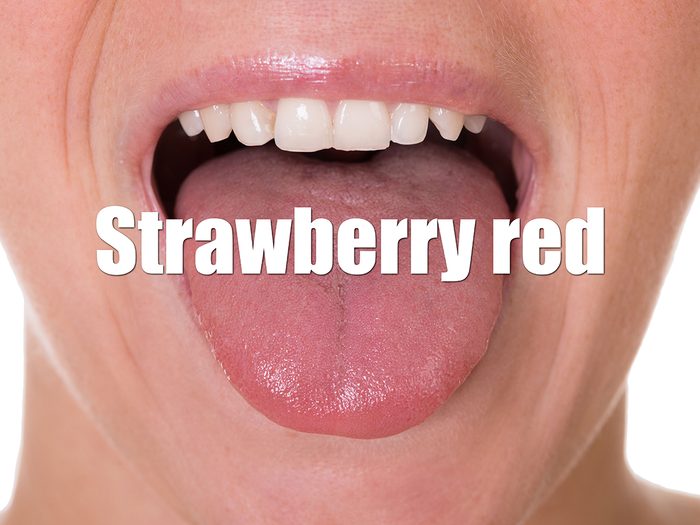
You see: Strawberry red
It could mean: You have a vitamin deficiency. A glossy, bright red tongue may be a sign your body is lacking iron or B12. “Vitamin B12 and iron are needed to mature papillae (small bumps) on the tongue,” says Naomi Ramer, DDS, director of Oral and Maxillofacial Pathology at Mount Sinai Hospital in New York. “If you are deficient in those vitamins, you lose those papillae, which can make your tongue appear very smooth.” If you are experiencing a vitamin deficiency you’ll most likely notice other symptoms as well, such as fatigue, weakness, balance problems, and memory difficulties.
In severe cases, this can cause pain when eating hot liquids or spicy food. Vegetarians are especially prone to low levels of B12, which is found in certain meats. “If you notice your whole tongue is a strawberry red colour, and you are a vegetarian, ask your doctor about taking supplements,” says Dale Amanda Tylor, MD, general and pediatric otolaryngologist at ENT Associates of Santa Barbara in Solvang and Santa Barbara, California. Notable vitamin deficiencies can also be associated with an autoimmune disease in the gastrointestinal (GI) tract, in which the stomach doesn’t absorb vitamins.
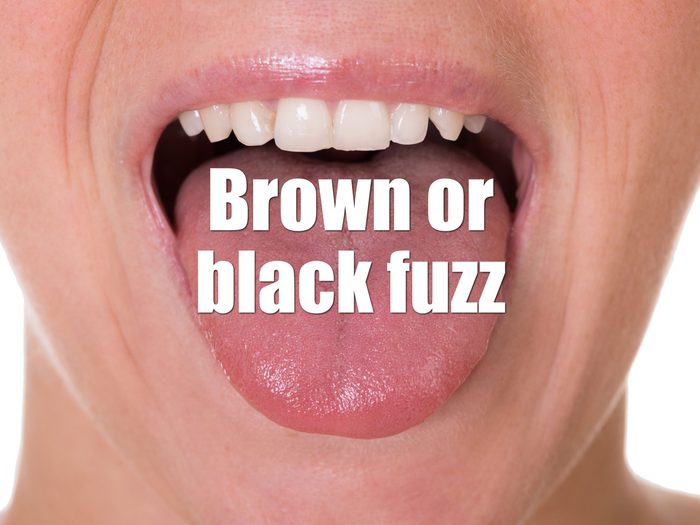
You see: Brown or black fuzz
It could mean: You don’t have the best oral hygiene or tongue health. A tongue covered in dark hairs (actually called black hairy tongue) may look nasty, but doctors agree that it’s not cause for major concern. “We have papillae, small bumps on the surface of our tongue, which grow throughout our lifetime,” explains Ada Cooper, DDS, a spokesperson for the American Dental Association and practicing dentist in New York.
Papillae are normally worn down by chewing and drinking, but sometimes they can become overgrown, which makes them more likely to harbour bacteria or become discoloured from food. This can cause bad breath or taste abnormalities. “Typically [black and hairy tongue] is brought on by smoking, drinking coffee and dark teas, or poor dental hygiene,” says Jack Krikor Der-Sarkissian, MD, a family physician with Kaiser Permanente in Los Angeles, California. “Removing the offending cause, like smoking, and brushing the tongue or using a tongue scraper, may be all you need.”
Don’t miss these secrets dentists want you to know.

You see: Cottage cheese white
It could mean: You have a yeast infection. A lumpy, white-coated tongue could be thrush, an oral yeast infection caused by overproduction of candida. The condition is often linked to antibiotics. “Your tongue is home to naturally occurring bacteria and yeast. When you take an antibiotic, which selectively kills off bacteria, it can allow yeast, which is not killed by antibiotics, to take over,” says Dr. Tylor. Thrush, which might cause taste disturbances or a bit of pain, can also occur in those with weakened immune systems. Typical in young children, thrush also affects people with autoimmune diseases, people with diabetes that isn’t well managed, chemotherapy patients, and the elderly. If you suspect you might have thrush, see your doctor.
Discover eight science-backed ways to boost your immune system.
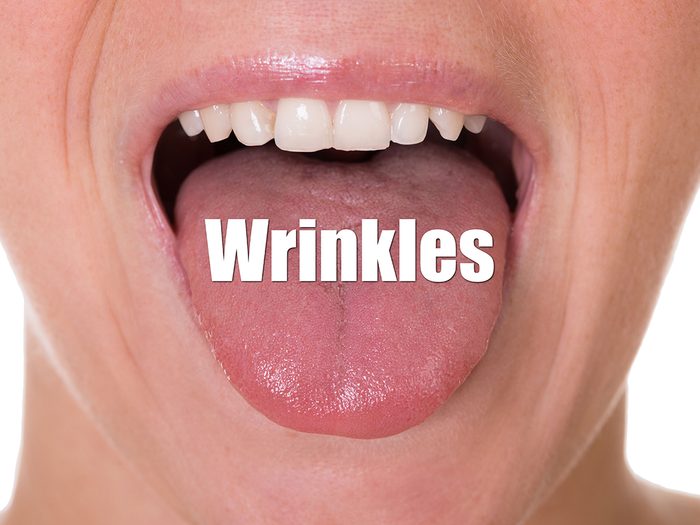
You see: Wrinkles
It could mean: You’re getting older (yes, even our tongues show signs of aging). Fissures and cracks in the tongue are typically harmless, but problems can arise if poor dental hygiene leads to infection within the crevices. “Once in a while a fungal infection can develop inside the clefts,” says Dr. Ramer. “You will suddenly have pain, a foul smell, and sometimes burning.” Often the infection is treated with a topical antifungal medication. Some dental appliances, like dentures, can also cause indentations on the tongue. “Make sure your dental fixtures fit well, drink enough water, and practice good oral hygiene like brushing your tongue,” says Dr. Der-Sarkissian.
Check out the sneaky reasons you’ve got bad breath (and how to deal with it).
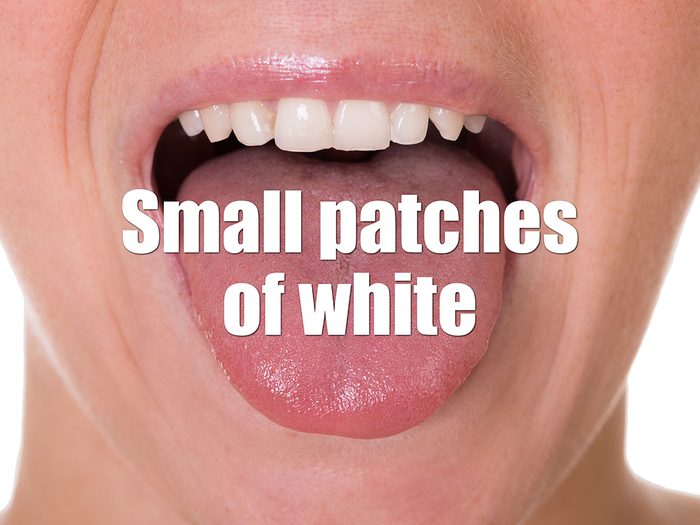
You see: Small patches of white
It could mean: Something is irritating your mouth. Painless white patches (called leukoplakia) are caused by an excess growth of cells. Often associated with smokers, the lesions have about a five to 17 per cent chance of developing into cancer. “If you’re a smoker, this is your body telling you that it’s starting to develop these precancerous lesions,” says Dr. Tylor. In many cases, leukoplakia can reverse when you stop smoking and will prevent you from getting a tongue disease.
Not a smoker? “The patches can also sometimes result just from the abrasion of the tooth constantly rubbing against the tongue,” says Dr. Cooper. “But if it doesn’t go away in a week or two, it’s extremely important to see your dentist, who might recommend a biopsy.”
Here are more cancer symptoms you might be ignoring.
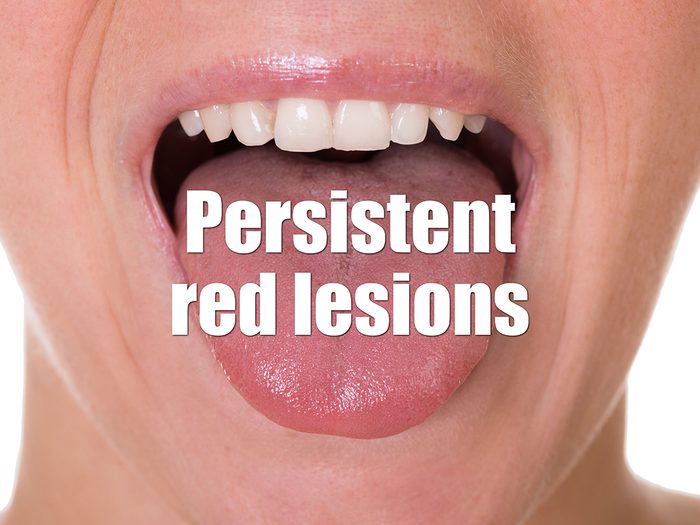
You see: Persistent red lesions
It could mean: Not be confused with a canker sore, which resolves itself within two weeks, red lesions or patches that don’t go away could be a more serious tongue disease. Get it checked immediately, doctors say. “With tongue cancer, you often think of an older, unhealthy person,” says Dr. Tylor. “But if you’re young and healthy and you have these, it doesn’t mean you’re okay. I’ve seen it in a 17-year-old girl.” Though typically attributed to tobacco use, oral cancer can also be caused by the human papillomavirus, or HPV. Get it checked out even if it’s not bothering you—many oral cancers don’t hurt in their early stages.
Learn to spot more signs of oral cancer.
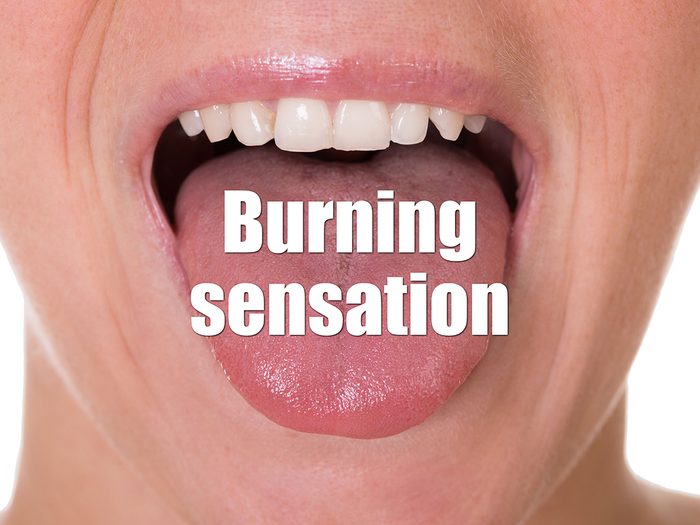
You feel: Burning sensation
It could mean: You’re using the wrong toothpaste. However, if your tongue stings and burns as though it’s been scalded—but looks perfectly normal—hormonal changes related to menopause could also be to blame. Though burning mouth syndrome can happen to anybody (it affects two per cent of the population), women are seven times more likely to experience it than men, according to the American Academy of Oral Medicine. It’s uncertain why this occurs, and the condition goes away in some individuals while it persists in others.
Some people can also experience burning sensations from developing an allergy to certain kinds of toothpaste. An ingredient called sodium lauryl sulfate (SLS), which helps toothpaste get foamy, can cause stinging—sometimes suddenly. “Someone might be using one toothpaste their entire life, and then suddenly, their mouth starts hurting,” says Dr. Tylor. “Switching to toothpaste without SLS, like Sensodyne, can help reduce some of the irritation.” For other causes, a doctor may be able to prescribe treatments such as antibiotic rinses or pills for neuropathic pain.
Find out the signs of disease your teeth can reveal.
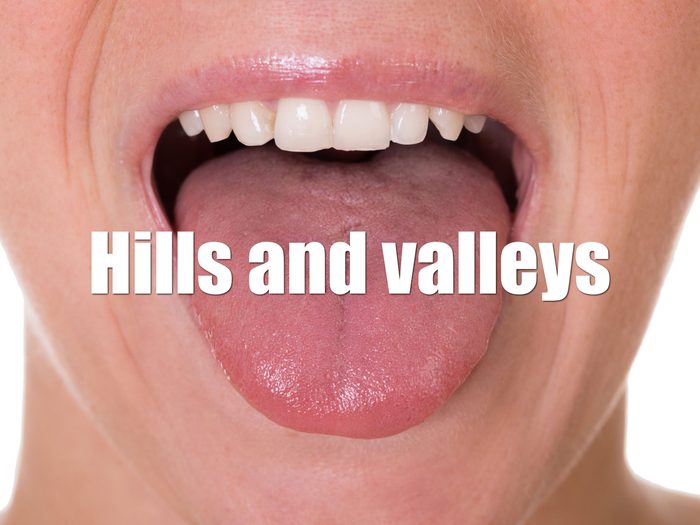
You see: Hills and valleys
It could mean: Absolutely nothing. If you have a unique looking tongue it doesn’t mean you have a tongue disease. A very normal, common condition, “geographic tongue” refers to a tongue that looks like bumpy terrain. Typically harmless, geographic tongue affects between one and 2.5 per cent of the population, according to the American Academy of Oral Medicine. Though the cause isn’t exactly clear, it could have to do with taste buds. “Taste buds sometimes can randomly shrink away,” says Dr. Tylor. “They can regenerate, so some go away and some don’t.” Geographic tongue typically requires no treatment or checkup, but if it becomes painful, a doctor may be able to prescribe an anti-inflammatory steroid paste or antihistamine rinse.
Here are 11 body parts you probably didn’t know you had.
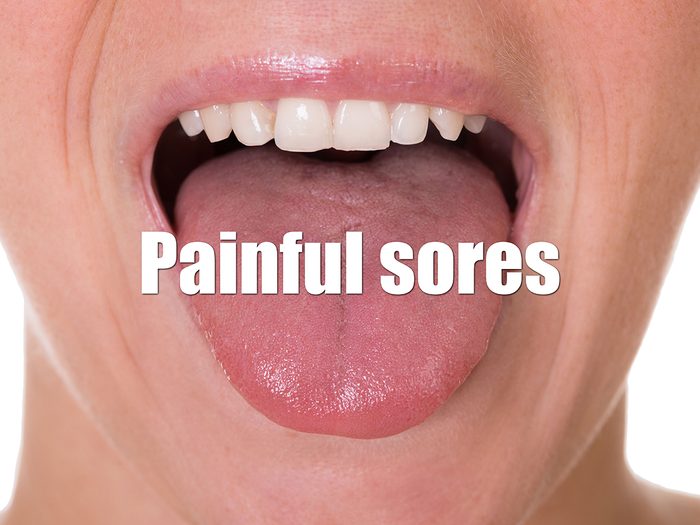
You feel: Painful sores
It could mean: You’re stressed. Many people have had the unpleasant experience of a canker sore. These are punched-out, painful areas that occur on the tongue or cheeks. They are most painful for the first four to five days, then subside and eventually disappear within two weeks. “We don’t really know why people get canker sores, but it’s probably something viral,” says Dr. Tylor. “People who are run down or stressed are prone to these ulcers.” Good news for your partner: They’re not contagious. Just make sure it’s not a cold sore, which is an extremely contagious sore (caused by the herpes simplex virus) that typically appears on the lips.
Now that you know what your tongue is trying to tell you, check out 20 symptoms you should never ignore.